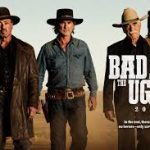“1887: The First Winter — Before the Legend, There Was the Storm”

There are winters that pass quietly, and there are winters that carve names into the soul of the earth. 1887: The First Winter is one of those stories — a haunting, snowbound prelude to the Dutton dynasty, where every breath feels stolen and every sunrise feels like a miracle.
Set in the brutal frontier of Montana, this Paramount+ limited series brings us back to the birth of the Yellowstone legacy — not with gunfire or grandeur, but with endurance, grief, and a kind of love that hurts to hold onto. Taylor Sheridan, the master of American tragedy, trades open plains for frozen silence, crafting a Western that feels both intimate and biblical in its scale.
James and Margaret Dutton, played with aching authenticity by Tim McGraw and Faith Hill, are no longer dreamers seeking paradise — they are survivors, clutching the fading warmth of their son’s laughter against a land that refuses to forgive. The chemistry between them burns slow and desperate, like embers refusing to die under the weight of snow.
But the storm does not come from the sky alone. Josh Brolin’s Elias Kane rides in like a ghost of progress, a man convinced that to own land is to conquer it. His arrival fractures what little peace the Duttons have left. Brolin’s performance is volcanic — restrained yet seething, the kind of menace born from conviction rather than cruelty.
The tension that unfolds is not one of armies and bullets, but of survival and spirit. Sheridan reminds us that the greatest wars are often fought without witnesses — in the quiet struggle between the human heart and the indifferent wilderness. Every creak of wood, every howl of wind, carries the echo of a promise: this land will take everything before it gives anything back.
LaMonica Garrett’s Thomas returns as the quiet backbone of dignity, his loyalty steady as the stars, while Zahn McClarnon’s Running Elk brings grace and wisdom that pierce through the cold. Their bond with the Duttons turns the series into something more than a Western — it becomes a meditation on belonging, and the price of calling a place home.
Visually, the series is staggering. The snow isn’t just scenery — it’s a living presence, a character that watches, devours, and tests. The cinematography captures Montana as both cathedral and graveyard, where light fractures through frost like faith itself struggling to survive. Each frame could hang in a gallery, yet every one bleeds with human ache.
The writing is spare but poetic, laced with lines that feel written on stone rather than paper. “Out here, love is the only fire that keeps you breathing,” Margaret says — and it’s not a metaphor. It’s a survival tactic. Sheridan’s dialogue moves like prayer and prophecy, balancing the myth of the West with the intimacy of a marriage on the edge of despair.
By the time the final episode fades, The First Winter doesn’t leave you with triumph — it leaves you with understanding. You feel the chill in your bones, but also the warmth of something that outlasts the cold: the will to build, to love, to endure.
Before there were ranches, empires, and bloodlines, there was this — a family half-buried in snow, refusing to vanish. 1887: The First Winter is not just a prequel; it’s the soul of the Yellowstone saga, stripped of glory and left to survive the night.
And when spring finally comes, you realize the land didn’t belong to them — they belonged to it.
Related movies:











